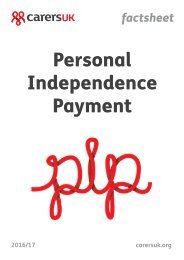data-protection-and-journalism-a-guide-for-the-media-draft
data-protection-and-journalism-a-guide-for-the-media-draft
data-protection-and-journalism-a-guide-for-the-media-draft
You also want an ePaper? Increase the reach of your titles
YUMPU automatically turns print PDFs into web optimized ePapers that Google loves.
Data <strong>protection</strong> <strong>and</strong> <strong>journalism</strong><br />
The <strong>journalism</strong> exemption<br />
comply with that provision, you must. The DPA must be more than just an<br />
inconvenience; you must have no o<strong>the</strong>r reasonable way to proceed.<br />
You must take into account all <strong>the</strong> circumstances of <strong>the</strong> particular case.<br />
You cannot rely on a blanket policy that you don’t have to comply with<br />
certain requirements; you must make a case-by-case decision. And this is<br />
not necessarily a blanket exemption from <strong>the</strong> whole DPA – just because<br />
you need to disapply one provision, that doesn’t mean you can ignore <strong>the</strong><br />
rest. You must be able to justify every apparent breach.<br />
Again, <strong>the</strong> focus is on <strong>the</strong> reasonable belief of <strong>the</strong> <strong>data</strong> controller. As with<br />
<strong>the</strong> public interest, we don’t have to agree with you, as long as your<br />
decision was reasonable. But you do need to show that you gave proper<br />
thought as to whe<strong>the</strong>r you could comply with <strong>the</strong> provision in question.<br />
Ensuring that st<strong>and</strong>ard checks <strong>for</strong> common <strong>data</strong> <strong>protection</strong> issues are<br />
embedded in existing editorial decision-making processes, <strong>and</strong> showing<br />
that you have a good institutional underst<strong>and</strong>ing of <strong>the</strong> DPA (eg staff<br />
training <strong>and</strong> guidance), will help you show that you made a reasonable<br />
decision.<br />
You will find it more difficult to rely on <strong>the</strong> exemption if <strong>the</strong>re is no<br />
evidence that <strong>data</strong> <strong>protection</strong> concerns were understood, raised or<br />
considered. It’s a good idea to keep some sort of audit trail in cases you<br />
think are controversial or particularly likely to prove contentious.<br />
Practical tips<br />
In practical terms, we recommend that you:<br />
have clear policies about what needs editorial approval;<br />
give all staff some basic <strong>data</strong> <strong>protection</strong> awareness training;<br />
have an inbuilt public interest check at key stages of a story;<br />
have an inbuilt <strong>data</strong> <strong>protection</strong> check at key stages of a story;<br />
keep an audit trail <strong>for</strong> decisions you think might be challenged.<br />
The key stages where a check might be needed are likely to include <strong>the</strong><br />
initial decision to pursue a story, any decision to use covert methods of<br />
investigation, <strong>and</strong> final decisions on what to publish.<br />
DRAFT 31




